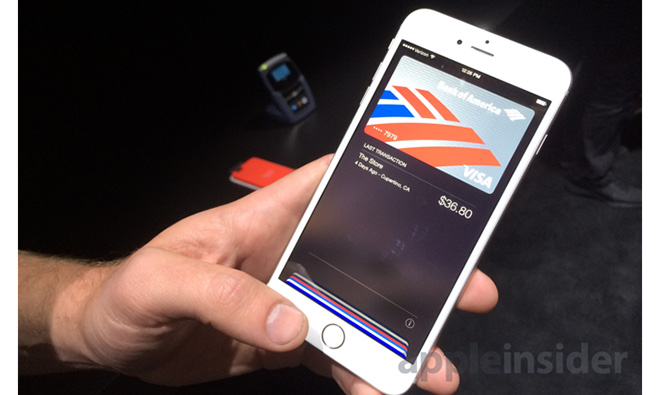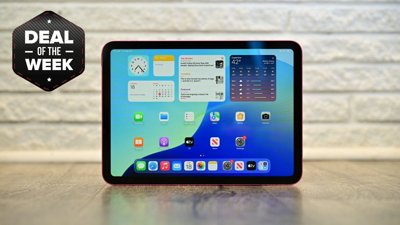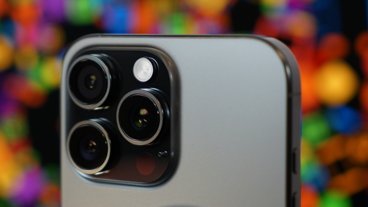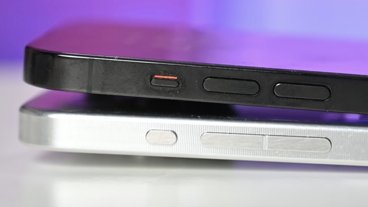Millions more consumers now have access to Apple Pay as BECU, Golden 1, Alliant, and First Tech — four of the ten largest credit unions in the country — have been added as partners alongside leading regional banks BBVA Compass and Fifth Third, while Samsung is rumored to introduce a payments program of its own at the Galaxy S6 launch next month.
BECU, or Boeing Employees' Credit Union, Alliant, First Tech, and Golden 1 together serve over 2 million members, primarily in the midwest and on the west coast. BBVA Compass — Â owned by Spanish banking giant BBVA — Â and Fifth Third Bank each rank among the 50 largest banks in the U.S.
Joining the new additions are smaller organizations Altra Federal Credit Union, Andrews Federal Credit Union, Ent Federal Credit Union, F&A Federal Credit Union, First Niagara Bank, INOVA Federal Credit Union, Savings Bank of Danbury, Star One Credit Union, and Uwharrie Bank.
Apple CEO Tim Cook revealed during the company's most recent earnings call that $2 out of every $3 spent with Visa, MasterCard, or American Express via contactless payments flow through Apple Pay. More than 750 institutions are now signed on to support it, and an international rollout is expected to begin soon.
With Apple Pay building steam as a competitive advantage for Apple, Samsung is once again rumored to be planning a mobile payments system of its own. The Korean-language DDaily indicates that Samsung's previously-reported partnership with LoopPay will come to fruition next month alongside the also-rumored shift to a Touch ID-style fingerprint sensor in the Galaxy S6.
LoopPay works differently than Apple Pay, and it remains to be seen how useful it will remain as the U.S. switches away from magnetic stripes in the coming years. LoopPay uses what it calls "magnetic secure transmission," which "spoofs" a traditional card swipe with magnetic fields when a user holds their device near a payment terminal.
Samsung is likely to have chosen this route in order to get a competing solution out as quickly as possible, in traditional "fast follower" mode. There is no word on what the company will do with the product in Europe, where magnetic swipes have already been largely phased out.
 Sam Oliver
Sam Oliver







-m.jpg)






 Marko Zivkovic
Marko Zivkovic
 Wesley Hilliard
Wesley Hilliard
 Christine McKee
Christine McKee
 Malcolm Owen
Malcolm Owen

 William Gallagher
William Gallagher






-m.jpg)



30 Comments
Let's get something straight. Samsung does not have a "competing solution". Samsung continue to do what they are very good at. Come out with crappy solutions on day one, say they are "at the forefront of innovation", let it hang on the vine for a couple months to rot away. Fandroids will preach - before even knowing the details - that SamsungPay is way more secure than ApplePay could ever be, even though none of them use it. There is not one product that Samsung has made, both on the software and hardware side, that is truly a "polished" product like the iPhone and iOS. Why do people continue to hype what is a failed company? Samsung makes crap. Accept it and move on. Whatever Samsung does in this department is going to be a dismal failure in the end.
BECU hasn't been Boeing Employee Credit Union since it was spun off years ago
Ah ah Looppay Sends over the air something that's not supposed to. Doesn't yet use tokens. Stores card numbers on the phone. And since it's not NFC, the phone needs to be manually unlocked, the app launched ecc... No one is going to use it.
Samsung has had what, 6 months to copy Apple? Like everything else they do, it will be sh**.
These articles come out every so often proclaiming "[I]11 new banks[/I]" or "[I]14 new banks[/I]"... and there are roughly 50 banks who are using Apple Pay at the moment. I understand this process takes time... but it seems like it will be a while until we get the [B][URL=http://www.apple.com/pr/library/2014/10/16Apple-Pay-Set-to-Transform-Mobile-Payments-Starting-October-20.html]500 banks[/URL][/B] that Tim Cook said before.